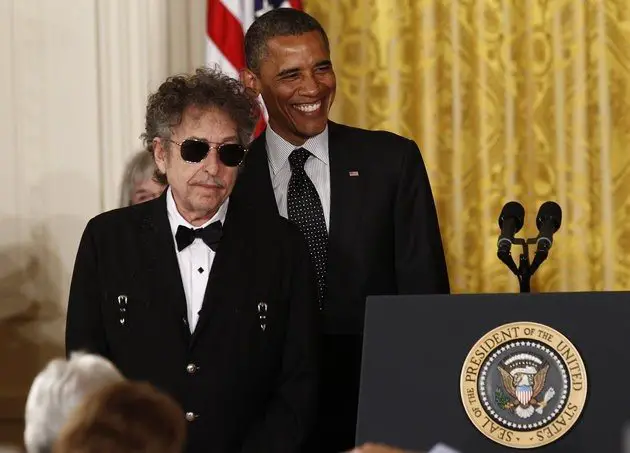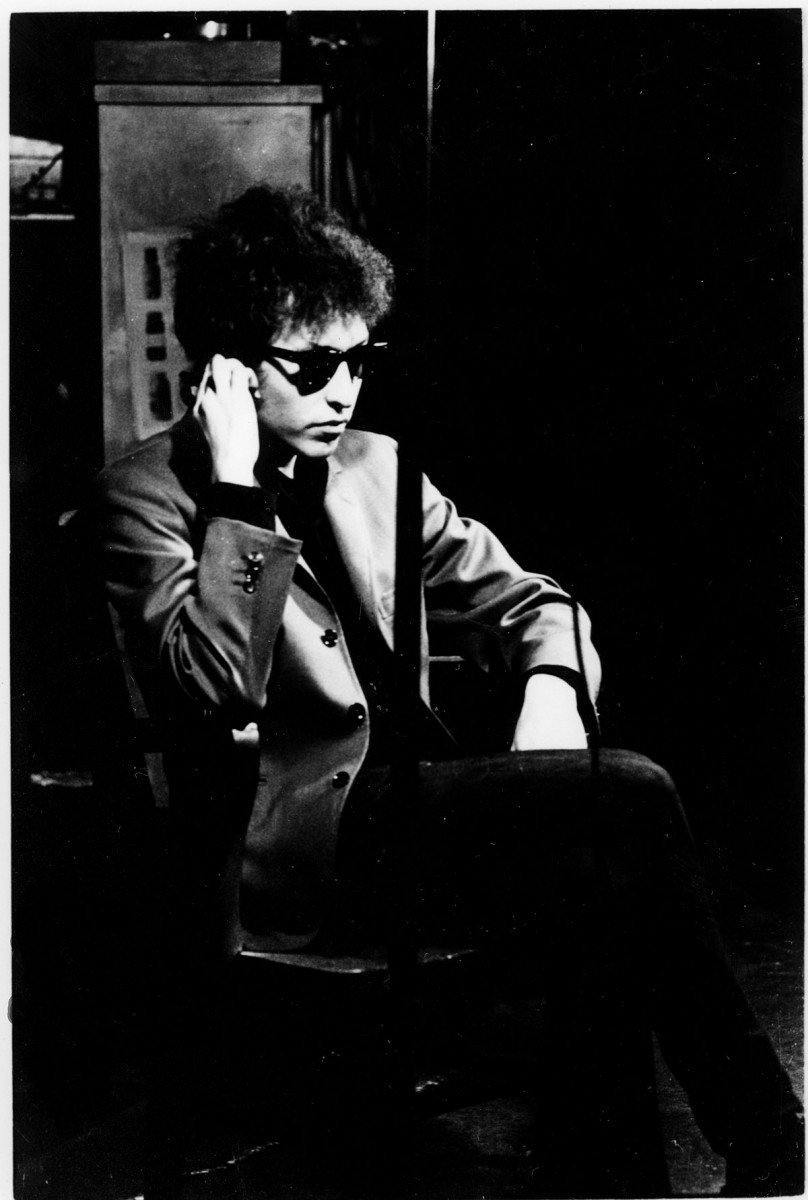The Swedish Academy announced today that it will award the 2016 Nobel Prize in Literature to Bob Dylan “for having created new poetic expressions within the great American song tradition.” The announcement breaks with convention, as past recipients of the prize have composed primarily in one or more of the traditional genres of fiction, poetry, non-fiction, or drama. According to the New York Times story by Altar, Chan, and Sisario, “the Nobel comes with a prize of eight million Swedish kronor, or just over $900,000. The literature prize is given for a lifetime of writing rather than for a single work.” Dylan is the first American to receive the honor since Toni Morrison in 1993.

Dylan is widely recognized as one of the most influential artists of the twentieth and twenty-first centuries, having been inducted in to the Rock and Roll Hall of Fame in 1988, while receiving twelve Grammy awards, an Oscar, a Golden Globe, a special citation from the Pulitzer prize committee, Kennedy Center honors, a National Medal of Arts, and the Presidential Medal of Freedom along the way. With this capstone achievement, Dylan has indubitably fulfilled the destiny many of his fellow musicians ascribed to him long ago. As Jerry Garcia had it, “Dylan gave rock n’ roll the thing I’d wished it had when I was a kid—respectability, some authority. He took it out of the realm of ignorant guys banging away on electric instruments and put it somewhere else altogether.” Though Garcia did not live to see it, we now know that ‘somewhere else altogether’ is to be among the planet’s foremost creators and thinkers in the annals of the Swedish Academy.
Bob Dylan was born as Robert Allen Zimmerman May 24, 1941 in Duluth, MN, and was subsequently raised in nearby Hibbing, MN. At the age of nineteen, he cut out for Greenwich Village with a few songs and a guitar, a wannabe folk singer following in the footsteps of Woody Guthrie. It was during this time, while performing at coffeehouses like the Gaslight Café and the Café Wha? that he honed his songwriting talent, cultivated his creative persona, and whetted his deft delivery to a razor-sharp edge. With the help of famed producer John Hammond, he released his eponymous debut in 1962. Its follow-up, The Freewheelin’ Bob Dylan came out in 1963, and when the folk trio Peter, Paul, and Mary recorded the timeless single “Blowin’ in the Wind,” it skyrocketed to number two on the Billboard charts, thus catapulting Bob Dylan into the American consciousness. In August of 1963, at the age of twenty-two, Dylan, accompanied by Joan Baez, performed “When the Ship Comes In” and “Only a Pawn In Their Game” at the March on Washington for Jobs and Freedom just before Dr. Martin Luther King, Jr. delivered his “I Have a Dream” speech.
Over the course of his decades-long career, Dylan has confounded audiences at every turn. In 1965 he took the Newport Folk Festival by storm, toppling the acoustic expectations of the folk enthusiasts in a blaze of electric guitar-driven guerrilla rock heretofore unknown, declaring “I ain’t gonna work on Maggie’s farm no more,” and taking the whole of pop music with him. In 1966, during the height of a hugely successful foray into electric rock, which saw the release of Bringing It All Back Home, Highway 61 Revisited, and Blonde on Blonde, following a devastating motorcycle crash, he disappeared from the scene altogether, holing up with The Band in Woodstock, NY to work on The Basement Tapes in secrecy, which would not be released until 1975. Of this period, Allen Ginsberg said, “He was writing shorter lines, with every line meaning something. Each line had to advance the story, bring the song forward…There was to be no wasted language, no wasted breath.”

More surprises followed in the coming decades, as Dylan went on to record a country album, 1969’s Nashville Skyline, score and star in the 1970 film Pat Garrett & Billy the Kid, and embrace a Christian rock phase, during which he released Slow Train Coming in 1979 and Saved in 1980. And in the years leading up to and following the turn of the millennium, Dylan experienced a profound reemergence as a supremely influential songwriter, albeit in a decidedly more jaded, wise, and curatorial register than that of his younger self’s high-strung psychedelic prophecies. His influence spread for the first time to a younger generation in search of stability in insoluble times, and for the second time for an older generation having grown decidedly jaded, wise, and curatorial themselves. Oh Mercy (1989), Time Out of Mind (1997), Love and Theft (2001), Modern Times (2006), Together Through Life (2009), and The Tempest (2012) form the canon for the latter half of Dylan’s recording career, which he has dutifully supported on his “Never Ending Tour,” which has been going strong since 1988. In keeping with tradition, Dylan has continued to defy expectations over the last few years by releasing a trio of classic cover albums, taking on tunes mostly from the traditional Christmas and Sinatra catalogues.
In addition to a prolific songwriting career, Dylan is a recognized painter, poet, scriptwriter, and memoirist. His drawings and paintings have been exhibited in galleries and museums around the world and featured in his Drawn Blank series, his experimental prose-poetry piece, Tarantula, appeared in 1971, a compilation titled “Writings and Drawings” was released in 1973, and his memoirs, Chronicles, came out in 2004.
In what has been a strange and unsurprising autumn already, the announcement of Bob Dylan, a simple song and dance man, as the newest Nobel laureate in literature comes as yet another strange unsurpise. Strange in that, like most aging institutions, we are here to stand witness to the dissolution of the borders and guidelines that have so far constituted the Nobel prize for literature; yet unsurprising because Bob Dylan’s mystic oral erudition is so worthy and deserving of this honor, despite having immigrated from a genre far, far away. Perhaps Kris Kristofferson, the songwriter, actor, Rhodes scholar, and William Blake expert, offered the best summary of Dylan’s body of work, proclaiming, “His songs take us to another level. He is absolutely a poet. He made songwriting into an art form, and made it worthy of committing your soul to.”
For more information, including tour dates and tickets, check out bobdylan.com, and for a full list of this year’s Nobel laureates visit nobelprize.org.
And if you need “something to open a new door / to show you something you seen before / but overlooked a hundred times or more,” then enjoy Bob Dylan’s spoken word performance, “Last Thoughts on Woody Guthrie,” from 1963.
[embedyt] http://www.youtube.com/watch?v=Q0OdNY8Aybw[/embedyt]


Comments are closed.